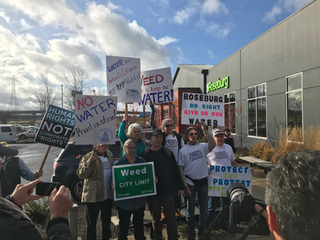
In 2019, the city of Weed, California, gave up its fight for water rights with Roseburg Forest Products after dealing with unending legal costs. But another legal battle has begun, this time on their behalf.
On April 22, Lauren Regan, executive director of Civil Liberties Defense Center, filed a lawsuit in the Superior Court of the State of California County of Siskiyou against the law firm that the suit says initiated a strategic lawsuit against public participation (SLAPP) against nine Weed residents.
The intent is to not only bring justice to the activists but also hold the law firm Churchwell White LLP that filed the lawsuit on behalf of Roseburg Forest Products accountable, Regan says.
A SLAPPback is a lawsuit that claims damages for being subject to a maliciously filed lawsuit according to California law. The state’s law says a SLAPPback is a way to protect free speech. California is one of eight U.S. states that allows such suits.
“It’s saying there wasn’t any lawful basis to bring this lawsuit other than for harassment or intimidation,” Regan says of SLAPPback suits.
The SLAPPback case is another development in the legal battle between water activists and Roseburg timber. Before International Paper sold the water rights to Roseburg timber in 1982, the city of Weed had an arrangement to pay $1 annually for water.
In 2016, Roseburg Forest Products wanted to sell more water to bottled water company Crystal Geyser Roxane, and have the city pay nearly $100,000 for a new water lease. The new lease required the city to find another source of water in two years and stop using the Beaughan Springs, which it had relied on for 110 years, according to the lawsuit.
After the city signed the new lease, members of Water for Citizens of Weed, California, (WCWC) discovered documents that showed International Paper had previously intended to hand off water rights to the city.
On May 11, 2017, the city of Weed sent a resolution to the California State Water Resources Control Board, asking for it to correct its records of who owns the Beaughan Springs. The next day, Roseburg Forest Products sued the city and the nine activists with WCWC, according to the lawsuit.
The ongoing lawsuit resulted in more than $600,000 in legal fees for the small town, according to a Dec. 19, 2019, press release from Protect the Protest.
Roseburg Forest Products dropped its case earlier this year.
Regan says the SLAPP case diverted the attention of the nine WCWC members from activism to the courtroom. She adds that the activists targeted in the lawsuit were elders of the city’s community — three of whom were former mayors.
The lawsuit says WCWC members were on fixed incomes and were unlawfully named in the SLAPP suit. Because of the members’ economic status, the case caused more psychological harm than when someone is normally sued. Several plaintiffs named in the SLAPP case who are members of WCWC are more than 80 years old, the lawsuit says.
Filling the SLAPPback is to go on the offense and deter other SLAPP suits that target environmental and human rights defenders, Regan says. That’s the goal of Protect the Protest, a coalition of 34 nongovernmental organizations such as the ACLU and Greenpeace.
“We started realizing that the extractive industries were sharing a playbook,” she says of law firms using SLAPP suits. “We realized that this momentum for filing SLAPP suits wasn’t coming from the clients. It was likely coming from lawyers.”
Regan is the lead attorney on the case. Although she isn’t admitted to the California Bar, she says she’s waiting to be admitted for this case only.
Regan says she has two goals for the lawsuit: the first is to get justice for the residents who were named in the SLAPP lawsuit and had to focus their energies in the courtroom; the second is to deter law firms like Churchwell White LLP and others from saying their client told them to file SLAPP suits.
She says lawyers can’t just do the bidding of corporate clients and say they were just doing their job.
“Lawyers have an ethical duty to make sure the claims that they bring and lawsuits that they file have merit, that they’re not frivolous, that they’re not being done for a malicious or a harassing purpose,” she says. “In this case, there’s really no other conclusion that you can draw that that was their intent.”
Regan says SLAPPs are an abuse of power. The idea of using the legal tactic probably wasn’t coming from Roseburg Forest Products, she adds. It was likely from its legal representation. And a SLAPP case is never appropriate, Regan says. It’s meant to silence a critic and is an abuse of the legal process.
Regan says SLAPPback cases are rare. In her 23 years of practicing law, she says she’s never filed one. Winning the lawsuit would put a public black eye on the law firm that used the SLAPP against the nine Weed activists.
“It’s a public deterrent,” she says. “It will definitely spread throughout the legal community like wildfire.”